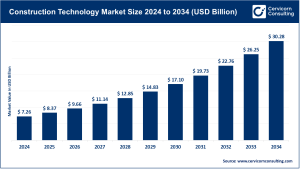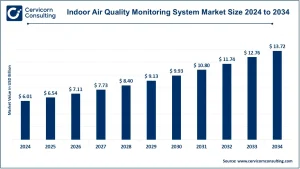Waste Management Market Overview
The global waste management market is estimated to be worth around USD 1,396.28 billion in 2024 and is projected to reach USD 2,357.82 billion by 2034, expanding at a CAGR of 5.38% between 2025 and 2034. This growth is primarily driven by rapid urbanization, industrialization, and the rising need for sustainable waste handling solutions worldwide.
Countries in the Asia-Pacific region—especially India and China—are heavily investing in modern infrastructure to manage increasing waste volumes. Meanwhile, North America and Europe are prioritizing circular economy models, focusing on recycling, resource recovery, and sustainable disposal practices. The integration of IoT and AI in waste management systems is further enhancing efficiency, enabling smart monitoring, automated collection, and data-driven decision-making.
👉 Get a Free Sample: https://www.cervicornconsulting.com/sample/2429
Key Market Trends
1. Smart Waste Management Systems:
IoT-enabled sensors and connected devices are revolutionizing collection systems by tracking bin levels, optimizing routes, and scheduling pickups more efficiently. These innovations help reduce carbon emissions, fuel consumption, and operational costs.
2. IoT and Data Analytics:
The adoption of real-time data analytics supports predictive modeling to anticipate waste generation trends. This enables optimized waste collection schedules and improved handling efficiency across urban and industrial settings.
3. Energy Recovery from Waste:
Emerging technologies such as Waste-to-Energy (WtE) and Anaerobic Digestion (AD) are being leveraged to convert waste into electricity, heat, and biogas, promoting renewable energy use while decreasing landfill dependency.
4. Waste Segregation & Recycling Innovations:
The use of AI-driven sorting systems and robotic recycling lines is improving material recovery rates, particularly for plastic waste and electronic waste (e-waste), boosting overall recycling efficiency.
5. Food Waste Management Initiatives:
Growing interest in anaerobic digestion and composting is turning food waste into biogas or organic fertilizer, helping reduce greenhouse gas emissions and promote sustainable waste disposal.
Market Drivers
-
Rising Waste Generation: Escalating urbanization and industrial expansion have led to a surge in municipal, industrial, and hazardous waste production.
-
Technological Advancements: Incorporation of AI, IoT, and robotics in waste handling is enhancing operational efficiency and lowering costs.
-
Government Initiatives: Implementation of Extended Producer Responsibility (EPR) policies and stringent landfill regulations are promoting sustainable waste practices.
-
Environmental Awareness: Increasing consumer demand for eco-friendly products and sustainable solutions is driving market growth.
-
Investment in Recycling Infrastructure: Leading companies are increasing investments—Waste Management Inc., for instance, committed USD 200 million in 2022, bringing total investments to over USD 700 million since 2018.
Impact of Trends and Drivers
-
Industrial Segment: Industrial waste remains the largest contributor, accounting for 69% of total revenue in 2024, with a growing focus on recycling and energy recovery solutions.
-
Regional Impact: The Asia-Pacific region holds the dominant 33.9% market share (2024), driven by industrial expansion and urban growth, followed by Europe with 28.9%, where circular economy initiatives are prevalent.
-
Service Applications: Collection services lead the market with 58% revenue share, bolstered by the adoption of smart routing and automated pickup systems.
Challenges & Opportunities
Challenges:
-
High upfront investment costs for IoT and recycling infrastructure.
-
Complex regulatory frameworks differing across regions.
Opportunities:
-
Expansion of Waste-to-Energy and food waste management projects.
-
Broader implementation of AI-powered sorting and smart waste networks.
-
Rapid urbanization in emerging economies such as India and China, offering high-growth potential.
Future Outlook
The waste management market is on track for consistent expansion, driven by sustainability goals, regulatory enforcement, and technological transformation. By 2034, the industry is expected to exceed USD 2,357.82 billion, underpinned by innovations like smart waste systems, AI-based recycling, and renewable energy recovery technologies. With continued focus on the circular economy and eco-friendly infrastructure investments, the sector is set to play a vital role in advancing global environmental sustainability and operational excellence.
📩 Contact Us for a Detailed Overview: https://www.cervicornconsulting.com/waste-management-market

